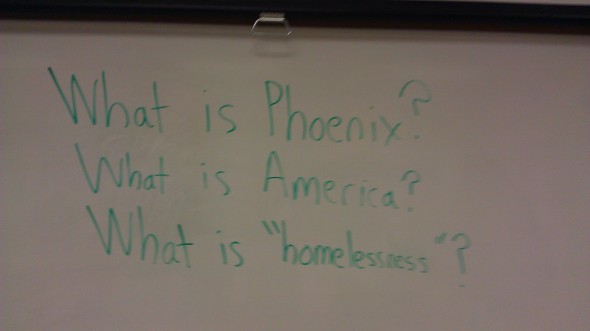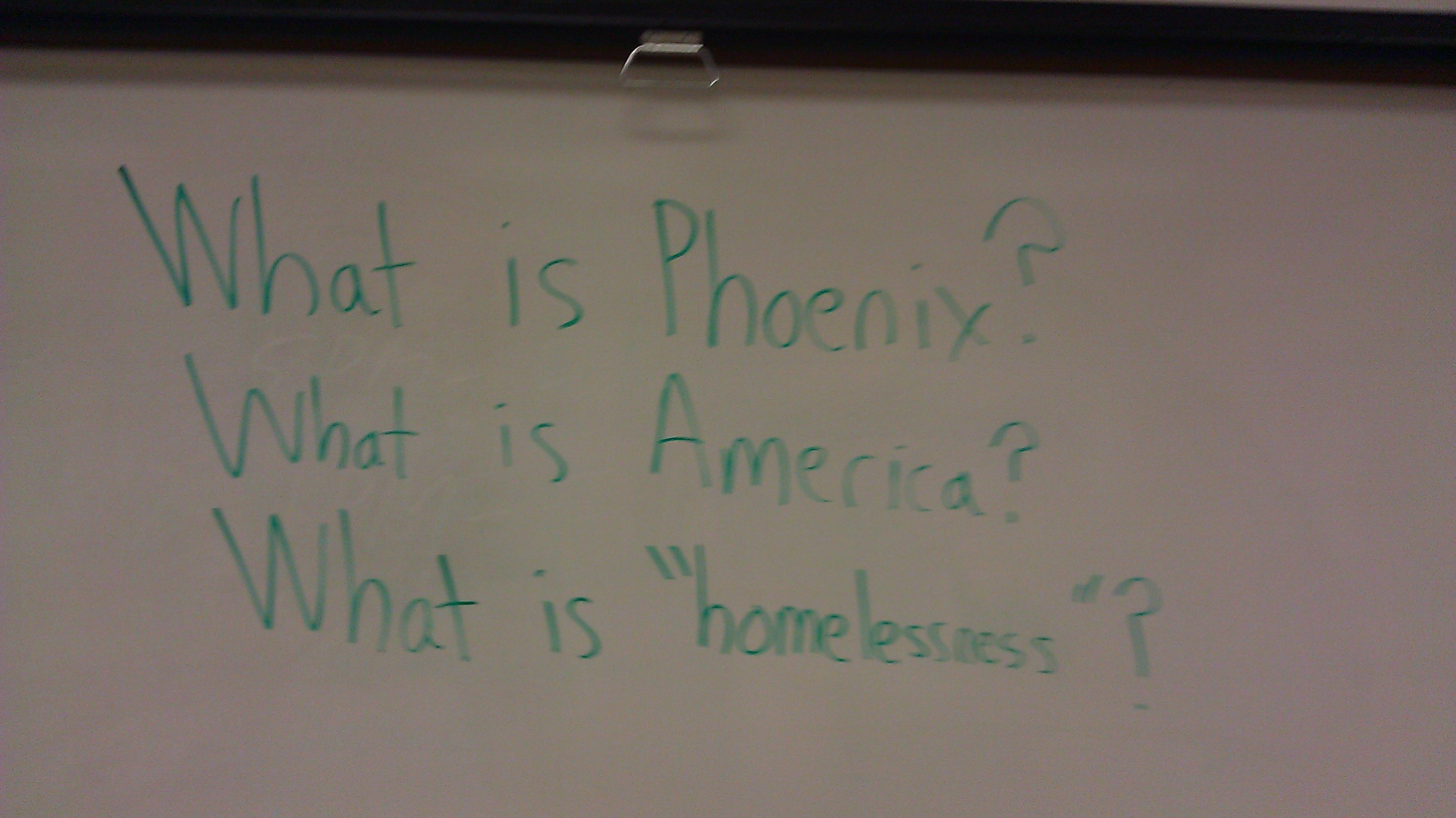Downtown Phoenix is probably my favorite part of the city, and luckily I have excuses to travel there twice a week. Mondays, it’s our Humphrey seminar. Fridays, I trek downtown for a very different reason.
I teach a creative writing class at Lodestar Day Resource Center, and also volunteer in their library. A full-time worker at the center is writing a book on homelessness, which I am helping to edit as well.
Today’s was a class of three, a little smaller than average. As a warm-up, I asked them to “practice writing honestly” and answer three questions, however they chose: “What is Phoenix?” “What is America?” “What is ‘homelessness’?”
The answers were amazing and diverse. An angry spoken word piece about America. An understated and touching poem about homelessness. A straightforward nonfiction description of Phoenix, that accidentally became a shocking personal story about a car wreck she saw first entering the city.
“The idea of someone living in a tent in this country says little about the decisions made by those who dwell within and so much more about our nation’s inability to adequately respond to our fellow residents in need.” -Neil Donovan, executive director, National Coalition for the Homeless
The more I volunteer at LDRC, the less difference I see between myself, whose life happens to be in a good place, and our clients, whose lives happen to be in a bad place. I’m not saying that all homeless people are victims of circumstance, and that none of them put themselves in the hole. But it’s easier to point at a beggar on the street and say, “You’re lower than me,” than to talk poetry with someone and say the same thing.
We have an abnormally large homeless population in this city (the treasurer of LDRC told me today that over 5,200 homeless get mail at the center, meaning that there are probably at least 8,000 homeless adults in the Valley at any time.) It’s also quite underserved, and many people I work with feel voiceless and ashamed.

Moments like these are when I wished there was some way to publish or legitimize these writers’ work. Some cities do have newspapers or magazines written by the homeless, and specifically covering the homeless. A good example is Portland’s Street Roots nonprofit newspaper.
My wish is to start something like this in Phoenix. Humphrey fellows: Your backgrounds may not be in publishing, or starting newspapers, or indeed in grassroots efforts at all. But you have experience in media. You know how to lead. You care about community. You have writing, organizational, and technical skills. You also have a community service requirement to fill for this seminar, haha, which is what I’m getting at right now. Maybe a few of you would be generous enough to help me explore options for creating a publication in Phoenix that’s written by, and for, its homeless population. It’s never been done before here, which is exactly why someone should try it.
I’ll end this blog post with a few facts about homelessness in America. I’d be interested to find out how they compare to the situation in your countries.
- Data on homeless population is scattered, new, incomplete – yet seems to indicate the problem is worse than most policy makers thought, and getting worse.
- A “homeless” person is defined by the U.S. government as one who “lacks a fixed, regular, and adequate night-time residence.”
- Between 1.6 million and 3.5 million Americans experience being homeless each year, depending on the source. But I’d guess high; homelessness is very hard to track, because about 3/7 of homeless people don’t utilize shelters or services.
- Approximately 39% of homeless are under 18 years old, and nearly half of homeless children are 5 years old or younger. Both those rates are higher than the national average.
- Overall estimate: 1.1% of Americans, and 2.2% of children, are homeless each year.
- Homelessness among military veterans is also an issue. In 2009, there were over 100,000 homeless vets, 70% of whom had substance abuse problems. Homeless vets are also more likely to have mental illness issues and sleep unsheltered.
- Nationwide, males and African-Americans are much more likely to be homeless than any other group. From my experience, the same is true in Phoenix.
SOURCES:
Arizona Coalition to End Homelessness
National Coalition for the Homeless
National Law Center on Homelessness and Poverty


A great post and a great suggetion for the Humphrey fellows to get involved.
I’m continually surprised by the homeless populations I see in the downtown area…most I encounter ask for food or money, but I really wish I had a better idea of services available so I could offer that as a more useful option.
Thanks for opening our eyes to an issue that America doesn’t always like to acknowledge it has.
This is a very insightful and rich blog. It reflects one of the major challenges the community of Phoenix meets.
I am afraid that the more the society has homeless people, the more it will suffer from high crime rates, in a way or another.
On my point of view, one of the main causes to homelessness is the high unemployment rate in Phoenix.
According to the Arizona’s official Web Site, the unemployment rate edges up to 9.4%. (August, 18, 2011). My concern here is not only the people who lost recently their jobs, but mainly those who have had no jobs for years.
One of an uncomfortable features I realized here in Phoenix is the widespread of MACHINE instead of HUMAN. It includes, but not limited to, parking, check points at airports, markets, newspaper and magazines selling points. Yes, technology is a privilege. But, it has, as well, its own expensive cost .
I think that to help homeless people find their own homes requires as well thinking how to help most of them, labor force in particular, to find jobs.
I am glad to participate as a volunteer in issuing any publication that will be dedicated for homeless people, to be written by them and publish for their sake. It is my honor to participate in such activity.. Regard.
It’s been said often as a parent that you are only as happy as your saddest child. Likewise, I think American can be only as happy as their least fortunate citizens.